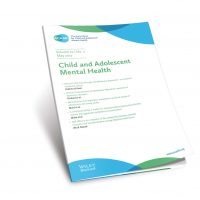Digital
-

Using machine-learning methods to identify early-life predictors of 11-year language outcome
Open Access paper from the JCPP – “This study aims to identify a parsimonious set of preschool indicators that predict language outcomes in late childhood, using data from the population-based Early Language in Victoria Study (n = 839)”. Loretta Gasparini et al.
Read more -

Internet based intervention (Emotion Regulation Individual Therapy for Adolescents) as add-on to treatment as usual versus treatment as usual for non-suicidal self-injury in adolescent outpatients: The TEENS randomised feasibility trial
Open Access paper from JCPP Advances – “We assessed the feasibility of Internet based Emotion Regulation Individual Therapy for Adolescents (ERITA) in psychiatric outpatients aged 13–17 years who engaged in NSSI”. Britt Morthorst et al.
Read more -

Preventing anxiety in the children of anxious parents – feasibility of a brief, online, group intervention for parents of one- to three-year-olds
Participants were recruited through primary and secondary care psychological services and social media. Emily Palmer, Matt Woolgar, Ben Carter, Sam Cartwright-Hatton, Fiona L. Challacombe (pic)
Read more -

Internet-delivered therapist-assisted cognitive therapy for adolescent social anxiety disorder (OSCA): a randomised controlled trial addressing preliminary efficacy and mechanisms of action
Open Access from the JCPP – “Forty-three youth (14–18 years) with SAD recruited through schools were randomly allocated to therapist-assisted Internet-delivered CT-SAD or waitlist for 14 week”. Eleanor Leigh (pic) and David M. Clark
Read more -

Assessing the feasibility of a web-based outcome measurement system in child and adolescent mental health services – myHealthE a randomised controlled feasibility pilot study
Open Access paper from the CAMH journal – “This study aimed to assess whether MHE improves the completion of the Strengths and Difficulties Questionnaire (SDQ) compared with paper collection. Secondary objectives were to explore caregiver satisfaction and application acceptability.” Anna C. Morris et al.
Read more -

Technology-based CBT for youth anxiety: moderate short-term benefits but uncertainty remains
Blog by Douglas Badenoch of The Mental Elf Service on Dr. Matti Cervin et al paper ‘Technology-delivered cognitive-behavioral therapy for pediatric anxiety disorders: a meta-analysis of remission, posttreatment anxiety, and functioning’.
Read more -

Digital Safety & Mental Health – recording (members)
This online conference explored digital safety and mental health for children and young people, give you an understanding of the issues related to digital safety in the UK context, and provide key tips, advice and recommendations. ACAMH members can now receive a CPD certificate for watching this recorded lecture.
Read more -

Finding strength from a bleak year
Professor Andrea Danese explains about the KeepCool project.
Read more -

CAMHS services in our physically distanced world
On March 23rd 2020, the way healthcare was provided in England had to change overnight. With the COVID-19 pandemic sweeping across the country, CAMHS staff had to adapt to the news that they must provide routine services from home where possible and all non-urgent face-to-face contact must cease to prevent the spread of the virus.
Read more -

A machine learning approach identifies unique predictors of borderline personality disorder
Researchers in the USA have identified critical predictors of borderline personality disorder (BPD) in late adolescence, using a machine learning approach. Joseph Beeney and colleagues harnessed data from a large, prospective, longitudinal dataset of >2,400 girls who were evaluated yearly for various clinical, psychosocial and demographic factors.
Read more